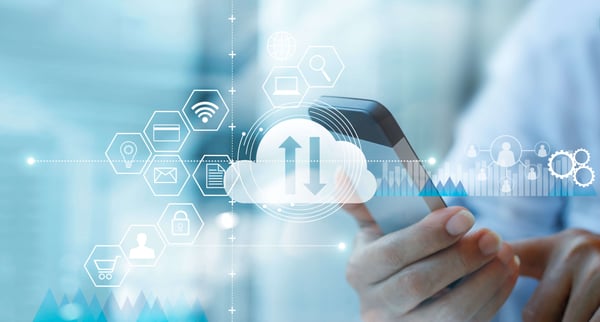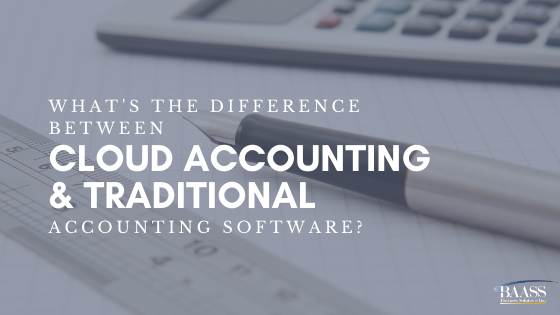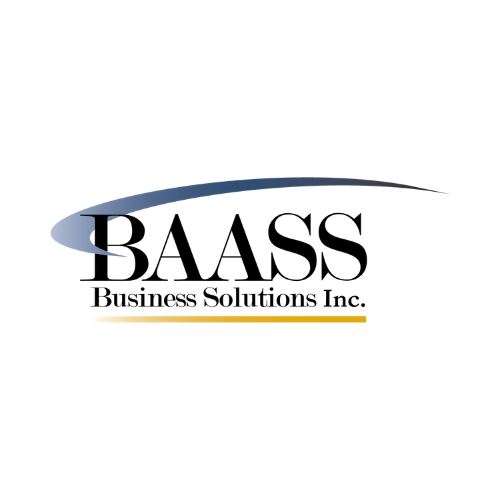The cloud has become an integral business technology tool. Cloud accounting is a phrase many are familiar with, but few truly grasp all of its benefits— especially in relation to traditional accounting system vs modern accounting systems.
To help your understanding, the BAASS Business Solutions’ team created a comprehensive guide to what you need to know about Cloud Accounting, its advantages, misconceptions, and where it stands beside traditional accounting software:

What Is Cloud Accounting?
Defined: Cloud accounting is very similar to on-premise software, but with one key difference. Cloud accounting software is hosted and maintained on central servers accessed via the internet. Users are able to use remote servers to store and access their data, instead of storing key information on a local computer or server.
Cloud accounting software has risen in popularity as a software deployment model. It is available with a variety of features and lends itself to companies of different sizes, ultimately placing itself as the answer to many organization’s financial management needs.
Cloud Accounting Helps With:
- Project budgeting
- Automation of manual accounting and bookkeeping functions
- Accessibility of data (from any location or device)
- Real-time data updates
- Paperless processes
- Cost reduction
- Financial forecasting
- Accounts payable & receivable
- Cash flow management
- Financial reports generation
- Business Intelligence
Cloud Vs. Traditional - Which Should You Choose?
Before accounting software moved to remote hosting on the cloud, they were commonly hosted on a hard drive of a desktop computer. Traditional Accounting Software comes with initial infrastructure costs as well as maintenance costs of on-site software and hardware.

Cloud computing, on the other hand, provides a software function without large upfront costs or licensing fees. This difference in cost is largely due to the fact that this software is stored, updated and maintained in the cloud in a central location. Having better control over their software, SaaS companies have more control over their software, reducing support cost, and cutting down on software pirating.
The SaaS software model (Cloud) is comparable to On-premise (Traditional), except it offers the flexibility and collaboration synonymous with the cloud. Financial business teams are able to use cloud accounting to retrieve real-time data, and mobile collaboration. This acts as an efficient organizational tool for your company to ensure accounts are accurate, balanced, and easily updated from anywhere in the world.
An example of a leader in cloud accounting software is Sage Intacct, a leading financial management software. Sage empowers business owners to create reports and dashboards that have a complete birds-eye view of KPIs and key company data. The software improves the visibility of your company's payments, expenses and spending patterns.
Difference In Cost:
Cloud accounting is typically more cost efficient than traditional ERP systems as it doesn't come with software versioning upgrades and ongoing IT maintenance fees.

Another key difference is that traditional software users are limited by a large up-front software fee whereas cloud accounting software is free of upfront costs. Instead, costs come with how many users are involved and what upgraded packages (add-ons) they choose to opt for. These packages are geared towards meeting specific needs and are only needed if the business owner deems it necessary.
Is My Financial Data Secure With Cloud Accounting?
As traditional accounting software were commonly hosted on your personal hard drive, there was no question about the security of financial and banking information. Although, a sure way to compromise information would be to have your computer stolen.
Cloud based software, however, have caused questions of information security due to the fact that the internet is easily accessible by so many around the world. That being the case, it is worth mentioning that traditional accounting software provided zero security once the device it was hosted on was taken or accessed by criminals. Cloud accounting, on the other hand boasts security advantages as every solution provides its own security solutions such as authentication and encryption. This reassures users that their information is protected online regardless where they are, or what device they use.
What To Look For In Cloud Accounting Software:
While there’s no denying the resourcefulness and efficiency of cloud accounting software, when picking the one right for your business there are some key elements to assess:
- Security: Security is key when it comes to accounting cloud software as financial information is exclusively private and requires protection. Make sure the software you are going with includes strong encryption, anti-malware and firewalls. Additionally, there should be evident methods such as avid monitoring in place to prevent the logging in of unauthorized users.
- Software Reliability: Be sure that your software is backing up your data, and that you will be able to access your data at any time. This ensures easy retrieval of misplaced data, and peace of mind that your information is secure and supported.
- Clarity: Your software’s job is to provide the ability to analyze your numbers efficiently, to create sound conclusions and educated estimations. Your platform should be user friendly and easy to navigate and understand. You should be able to access your data with ease, with all your information seamless to analyze and compare with other numbers.
Accounting is a field that has greatly benefited from a systematic move to the cloud. After all, there are a wide variety of cloud-based software available. This provides ample choice for what works best for your company. It can be hard for expanding companies to accommodate for the growing demands of an increasing amount of clients -- which is where accounting software solutions shine.
The cloud is the future. Cloud based software come with security that ensures the protection of your data, and provides the convenience of having your data accessible from any location and any device. Above all, the seamlessness and efficiency of the cloud compared to traditional accounting software is impossible to deny.
Read about Skoah's successful Sage Intacct ERP implementation!

